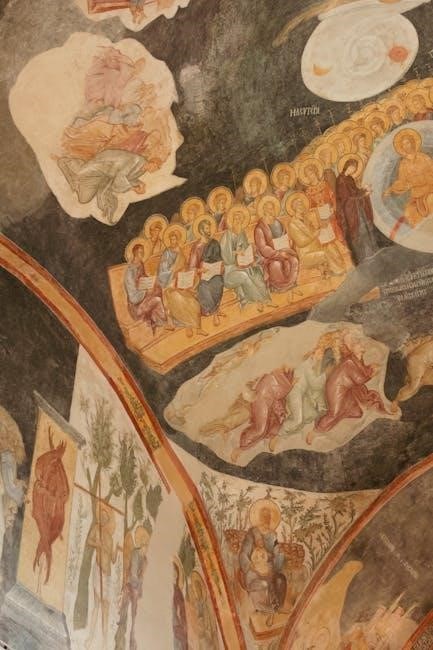Biblical numerology explores the symbolic meanings of numbers in Scripture, revealing divine patterns and truths. From 1 to 1000, each number carries spiritual significance, reflecting God’s sovereignty, creation, and redemption.
Overview of the Significance of Numbers in the Bible
Numbers in the Bible carry profound symbolic and spiritual meanings, reflecting divine patterns and truths. From creation to redemption, they reveal God’s sovereignty and plan. The amplified Holy Bible highlights the full meaning behind original texts, while resources like “A Book of Numbers” by Everand explore these themes. Numbers like 1 symbolize unity, 7 perfection, and 1000 eternity, offering insights into prophecy, worship, and spiritual lessons. Studying these numerical patterns enriches biblical understanding and reveals deeper theological truths.
Historical Context of Number Symbolism
Number symbolism in the Bible is deeply rooted in ancient Hebraic culture and theology. The original Greek and Hebrew texts reveal numerical patterns reflecting divine truths. For instance, the number 7 symbolizes completeness, while 40 represents trials and transformation. These symbols were integral to Jewish rituals, prophecies, and worship, offering insights into God’s plan. The Amplified Holy Bible and resources like “A Book of Numbers” by Everand provide deeper understanding, highlighting how these numbers convey spiritual and theological meanings across generations.

The Biblical Meaning of Numbers 1-10
Numbers 1-10 in the Bible carry profound spiritual meanings, from unity (1) to completion (10). Each number symbolizes divine truths, reflecting God’s order and plan for humanity.
Number 1: Unity and Divine Sovereignty
The number 1 signifies unity, representing God’s singular nature and divine sovereignty. It embodies the oneness of God, as expressed in Deuteronomy 6:4, “Hear, O Israel: The Lord our God, the Lord is one.” This number also symbolizes the first day of creation and the first commandment, emphasizing its primacy in God’s order. In biblical numerology, the number 1 underscores the uniqueness and supremacy of God, reflecting the foundation of monotheism and the beginning of all divine truths.
Number 2: Division and Witness

The number 2 represents division, witness, and agreement in biblical numerology. It reflects the separation of light from darkness in Genesis 1:4 and the two great lights in Genesis 1:16. Symbolizing testimony, two witnesses are required for confirmation in legal matters (Deuteronomy 19:15). The number also signifies duality, such as the two tablets of the Ten Commandments. It embodies harmony and balance, often representing divine confirmation and the principle of agreement, as seen in Matthew 18:20, where two or three gather in Jesus’ name.
Number 3: Perfection and Completeness
The number 3 symbolizes divine perfection and completeness in the Bible. It represents the Trinity: Father, Son, and Holy Spirit. Jesus rose on the third day, fulfilling redemption. Peter denied Jesus three times, highlighting human frailty. The earth was divided into three parts after the flood (Genesis 10:25), and Jonah spent three days in the fish, prefiguring Christ’s resurrection. The number 3 embodies divine order, completion, and the perfection of God’s plan and purpose in both creation and redemption.
Number 4: Creation and Earth
The number 4 symbolizes creation and the earth in biblical numerology. God created the earth and its structures in fours: the four seasons, four directions (north, south, east, west), and four rivers in Eden (Genesis 2:10-14). The earth is often represented by fours, emphasizing its completeness. The four living creatures in Ezekiel and Revelation signify God’s presence and governance over creation. This number underscores the earthly realm and humanity’s role within it, reflecting divine order and stability.
Number 5: Grace and Atonement
The number 5 in the Bible symbolizes God’s grace and atonement. It represents divine provision and redemption, as seen in the five books of Moses, which outline God’s plan for humanity. The number also appears in the five loaves used by Jesus to feed the multitude, demonstrating God’s grace in meeting human needs. Additionally, Leviticus 16 highlights the atonement process, emphasizing sacrifice and forgiveness. Thus, the number 5 reflects God’s loving grace and His plan to reconcile humanity through atonement.
Number 6: Imperfection and Humanity
The number 6 in the Bible represents imperfection and humanity’s frailty. It reflects the incomplete nature of creation before God’s rest on the seventh day. Humanity, created on the sixth day, carries this imperfection, as seen in the fall of Adam. The number also symbolizes human limitation, as in the story of Goliath, where David used six stones to defeat a giant, highlighting human weakness and the need for divine intervention to overcome it;
Number 7: Perfection and Spiritual Completeness

The number 7 is deeply symbolic in the Bible, representing perfection, completeness, and spiritual fulfillment. It is often associated with God’s divine plan, as seen in the seven days of creation and the seventh day of rest. The number also appears in rituals, such as the seven lamps on the golden candlestick and the seven seals in Revelation. It signifies divine order and the culmination of God’s purposes, reflecting both earthly and heavenly completeness.
Number 8: New Beginnings and Resurrection
The number 8 symbolizes new beginnings, resurrection, and regeneration in the Bible. It represents a fresh start, as seen in the eighth day of creation when God established the new order. Jesus rose on the eighth day, signifying victory over death and the dawn of eternal life. Circumcision was performed on the eighth day, marking a child’s dedication to God. The number 8 also reflects abundance and divine multiplication, emphasizing God’s redemptive plan and the promise of a new creation.
Number 9: Judgment and Finality
The number 9 in the Bible is often associated with judgment and finality, representing the culmination of divine decisions. It signifies completeness in a solemn sense, as seen in the ninth hour of darkness during Jesus’ crucifixion, marking the finality of His sacrifice. Additionally, the ninth plague in Exodus, the plague of darkness, symbolizes God’s judgment before the deliverance of Israel. Thus, number 9 underscores the irreversible nature of divine judgment and the completion of His purposes.

Number 10: Completion and Ordinal Perfection
The number 10 in the Bible signifies completion and ordinal perfection, representing the fulfillment of a divine order or sequence. It is seen in the Ten Commandments, symbolizing a complete moral code, and in the tithe, or tenth, as an act of worship and obedience. The tenth jurisdiction in the parable of the talents also highlights accountability and stewardship. Thus, number 10 embodies the completion of a cycle or plan, reflecting God’s structured and orderly nature.

The Biblical Meaning of Numbers 11-50
The numbers 11 to 50 in the Bible convey diverse symbolic meanings, each reflecting unique themes such as divine order, judgment, redemption, and spiritual growth.
Number 12: Perfection of Government
The number 12 signifies divine order and completeness in governance. It is seen in the 12 tribes of Israel, symbolizing God’s chosen people, and the 12 apostles, representing the foundation of the church. The 12 stones in the Jordan River and the 12 gates of the New Jerusalem further emphasize its association with structure and divine authority. This number reflects God’s perfect plan for governing His people and establishing His kingdom on earth.
Number 13: Rebellion and Judgment
The number 13 is often associated with rebellion and divine judgment in the Bible. It signifies the breaking of order and the consequences of sin. Examples include the 13th verse of Genesis 7, where the Flood began, and Genesis 14:4, where rebellion occurred in the 13th year. This pattern reflects God’s judgment on rebellion, emphasizing the spiritual principle of accountability and the consequences of turning away from His will.
Number 14: Deliverance and Redemption
Number 14 symbolizes deliverance and redemption in the Bible. It often represents God’s intervention to save His people. For instance, King Hezekiah’s life was extended by 14 years, signifying divine deliverance (2 Kings 20:6). Additionally, the 14th day of Nisan marks the Passover, a pivotal event of redemption. This number underscores God’s faithfulness in rescuing His people from bondage and fulfilling His promises, reflecting His mercy and salvation.
Number 15: Rest and Worship
Number 15 symbolizes rest and worship in the Bible, often marking moments of spiritual renewal. For example, the Feast of Tabernacles begins on the 15th day of the seventh month, emphasizing rest and celebration of God’s provision. Similarly, the 15th day of Nisan is the start of the Feast of Unleavened Bread, a time of reflection and worship. This number underscores the importance of pausing to honor God and seek spiritual rejuvenation, reflecting divine rhythm in life and worship.
Number 20: Redemption and Priesthood
Number 20 in the Bible signifies redemption and priesthood, highlighting divine deliverance and spiritual service. It is associated with the redemption of the firstborn in Exodus, symbolizing God’s claim on humanity. The priesthood, particularly the Levites, began their sacred service at age 20, emphasizing maturity and readiness for divine work. This number underscores the themes of sacrifice, consecration, and the role of priesthood in mediating between God and humanity, reflecting a deeper call to spiritual responsibility and redemption.
Number 30: Maturity and Dedication
Number 30 represents maturity and dedication, often symbolizing a readiness for leadership and spiritual responsibility. In the Bible, David became king at age 30, marking a transition to maturity and divine appointment. Similarly, priests began their service at 30, signaling a season of consecration and readiness to fulfill sacred duties. This number reflects the completion of preparation and the onset of active service, emphasizing faithfulness and devotion to God’s purpose.
Number 40: Testing and Wilderness Experience
Number 40 symbolizes testing, trial, and spiritual preparation in the Bible. It often represents a period of refinement and growth through adversity. Moses spent 40 years in the wilderness before leading Israel, and Jesus fasted for 40 days before beginning His ministry. This number underscores the idea of enduring challenges to emerge stronger and ready for divine purposes, reflecting a season of purification and trust in God’s plan.
Number 50: Jubilee and Freedom
Number 50 signifies the Year of Jubilee, a time of liberation and restoration in Israel. Leviticus 25 outlines its observance, where debts were forgiven, slaves freed, and land returned to its rightful owners. This number symbolizes freedom, redemption, and the resetting of societal structures. It also represents the ultimate release from bondage, reflecting God’s mercy and justice. The Jubilee trumpet, or “Yobel,” announced this sacred time, emphasizing its spiritual and communal significance.

The Biblical Meaning of Numbers 51-1000
Numbers 51-1000 symbolize deeper spiritual truths, divine plans, and fulfillment of God’s purposes. They often represent completeness, judgment, or eternal realities, reflecting His sovereign design.

Number 100: Jubilee and Praise
The number 100 symbolizes jubilee, freedom, and joyful celebration, marking the release from bondage and the restoration of God’s people. In Leviticus 25, the Jubilee year proclaims liberty and return to ancestral heritage, reflecting divine redemption. It also signifies completeness, as 100 represents the culmination of cycles, embodying praise and thanksgiving for God’s faithfulness. This number highlights ultimate liberation and eternal celebration in God’s presence.
Number 300: Warfare and Triumph
The number 300 signifies spiritual warfare and divine triumph, as seen in Gideon’s 300 warriors who defeated the Midianites, illustrating trust in God’s power over numerical strength. It represents effective spiritual warfare, where a dedicated few, empowered by God, achieve remarkable victories. This number underscores divine intervention and the triumph of faith, highlighting the biblical theme of trusting God in adversity for ultimate success and glory.
Number 400: Generational Cycles
The number 400 in the Bible symbolizes generational cycles and divine timing. It often represents a span of time linked to the rise and fall of generations, as seen in the 400 years of affliction promised to Abraham’s descendants before their deliverance. This number signifies the completion of a cycle, emphasizing God’s patience and plan across generations. It also reflects periods of testing and preparation, highlighting the cyclical nature of history and the ultimate fulfillment of divine promises.
Number 500: Grace and Redemption
The number 500 in the Bible symbolizes grace and redemption, often representing a time of divine favor and deliverance. It is closely tied to the concept of Jubilee, where debts were forgiven and slaves were freed, highlighting God’s mercy. In spiritual contexts, 500 signifies the ultimate redemption through Christ, emphasizing liberation from sin and the restoration of humanity. It also reflects the completeness of divine grace, offering a new beginning and freedom for believers.
Number 700: Completion and Perfection
The number 700 in the Bible represents completion and perfection, often symbolizing the fulfillment of divine plans. It is associated with the number 7, which signifies completeness, and is amplified by the factor of 100, denoting a perfect conclusion. In biblical contexts, 700 can signify the ultimate realization of God’s purposes, emphasizing spiritual fulfillment and the culmination of His redemptive work. It reflects the idea of finality and the perfect harmony of divine design.
Number 1000: Ultimate Completion and Eternity
The number 1000 symbolizes ultimate completion and eternity in the Bible, representing the final fulfillment of God’s divine plan. It is often linked to the Millennial Kingdom, where Christ reigns for a thousand years, signifying the culmination of earthly history. The number 10, representing completeness, is cubed (10x10x10), emphasizing absolute finality and perfection. It reflects God’s eternal sovereignty and the eternal life believers will experience, marking the end of time and the beginning of eternity.

Cultural and Historical Context of Biblical Numbers
Biblical numerology is deeply rooted in ancient Near Eastern traditions, with numbers carrying symbolic meanings shaped by Hebrew and Greek cultures. Numbers often represented divine order, reflecting God’s creation and governance. Their usage in rituals, prophecies, and daily life emphasized spiritual truths, making them a bridge between earthly experiences and heavenly realities.
The Influence of Hebrew and Greek Numerology
Hebrew numerology often linked numbers to word meanings, with each letter having a numeric value, revealing deeper spiritual truths. Greek numerology emphasized philosophical and symbolic meanings, influencing early Christian interpretations. Both traditions viewed numbers as reflections of divine order and creation. Hebrew focused on covenant themes, while Greek highlighted philosophical concepts like unity and completeness. Together, they shaped the symbolic language of the Bible, offering layers of meaning that continue to inspire study and reflection in biblical numerology today.
Numbers in Biblical Prophecy and Eschatology
Numbers play a pivotal role in biblical prophecy and eschatology, often symbolizing divine plans and timelines. For instance, the number 7 signifies completion, seen in the seven seals and trumpets in Revelation. The number 12 represents God’s people, as in the 12 tribes and 12 apostles. The number 40 symbolizes testing, such as the 40 years in the wilderness or the 40 days of rain in Noah’s flood. The number 1000 represents the Millennium, highlighting Christ’s reign. These numerical patterns reinforce the divine order and ultimate redemption in biblical prophecy.
Symbolism of Numbers in Jewish and Christian Traditions
In Jewish and Christian traditions, numbers carry profound symbolic meanings rooted in scripture and cultural practices. The number 7, for example, is revered in both traditions as a symbol of divine perfection, reflected in the seven days of creation and the seven churches in Revelation. Similarly, the number 12 signifies God’s chosen people, seen in the 12 tribes of Israel and the 12 apostles. These numerical symbols bridge tradition and faith, offering deeper insights into spiritual truths and cultural heritage.

Practical Application of Biblical Numerology
Biblical numerology offers insights for prayer, worship, and spiritual growth. Understanding number symbolism helps believers interpret divine messages and apply spiritual truths to their daily lives effectively.
Understanding Numbers in Prayer and Worship
In prayer and worship, numbers carry profound spiritual significance. For instance, the number 7 symbolizes completeness, often used in prayers for perfection or fulfillment. The number 40 represents perseverance and preparation, inspiring believers to pray for strength during trials. Incorporating biblical numerology enriches worship by aligning praises with divine patterns, fostering deeper connections to God’s Word. This practice encourages believers to seek spiritual truths embedded in numbers, enhancing their devotion and faith.
Interpreting Numbers in Dreams and Visions
Numbers in dreams and visions often carry symbolic meanings rooted in biblical numerology; For example, seeing the number 7 may signify spiritual completeness or divine perfection. The number 40 could indicate a season of testing or preparation. Interpreting these numbers requires prayer and discernment, as they may hold personal or prophetic significance. Understanding their biblical context helps uncover deeper truths, guiding believers to align their lives with God’s purpose and plan.
The Role of Numbers in Spiritual Warfare
Numbers play a significant role in spiritual warfare, often symbolizing divine strategies or heavenly backing. For instance, the number 7, representing perfection, may signify a complete defense against evil. The number 40, linked to testing, could symbolize enduring trials and emerging victorious. Prayers and worship often incorporate specific numbers to align with God’s will, enhancing spiritual strength. Understanding these numerical patterns can empower believers to trust in God’s plan and victory, even in intense spiritual battles.
Biblical numerology offers profound insights into God’s plan, with numbers carrying symbolic meanings. For deeper study, explore resources like “The Biblical Meaning of Numbers” by E.W. Bullinger.
Summarizing the Biblical Meaning of Numbers
Biblical numbers from 1 to 1000 carry symbolic meanings reflecting God’s divine plan. Numbers like 7 and 1000 signify perfection and eternity, while 40 and 400 represent testing and generations. Each number, whether small or large, is woven into biblical narratives, prophecies, and spiritual truths, offering deeper insights into God’s nature and humanity’s journey. Understanding these meanings enriches one’s appreciation of Scripture and its timeless message.
- Numbers reveal divine patterns and purposes.
- They symbolize spiritual truths and earthly realities;
- Each number contributes to the biblical tapestry of redemption and eternity.
Recommended Resources for Further Study
For deeper exploration, consider books like Biblical Numerology by E.W. Bullinger and The Numbers of the Bible by Nathan Stone. Online resources such as BibleStudy.org and Bibleref.com offer detailed analyses. PDF guides like The Biblical Meaning of Numbers 1-1000 provide comprehensive insights. Additionally, courses on biblical numerology from institutions like Moody Bible Institute or Dallas Theological Seminary can enhance understanding. These resources enrich your study of number symbolism in Scripture.
- Books by E.W. Bullinger and Nathan Stone.
- Online platforms like BibleStudy.org.
- PDF guides for in-depth analysis.
- Biblical courses for structured learning.

